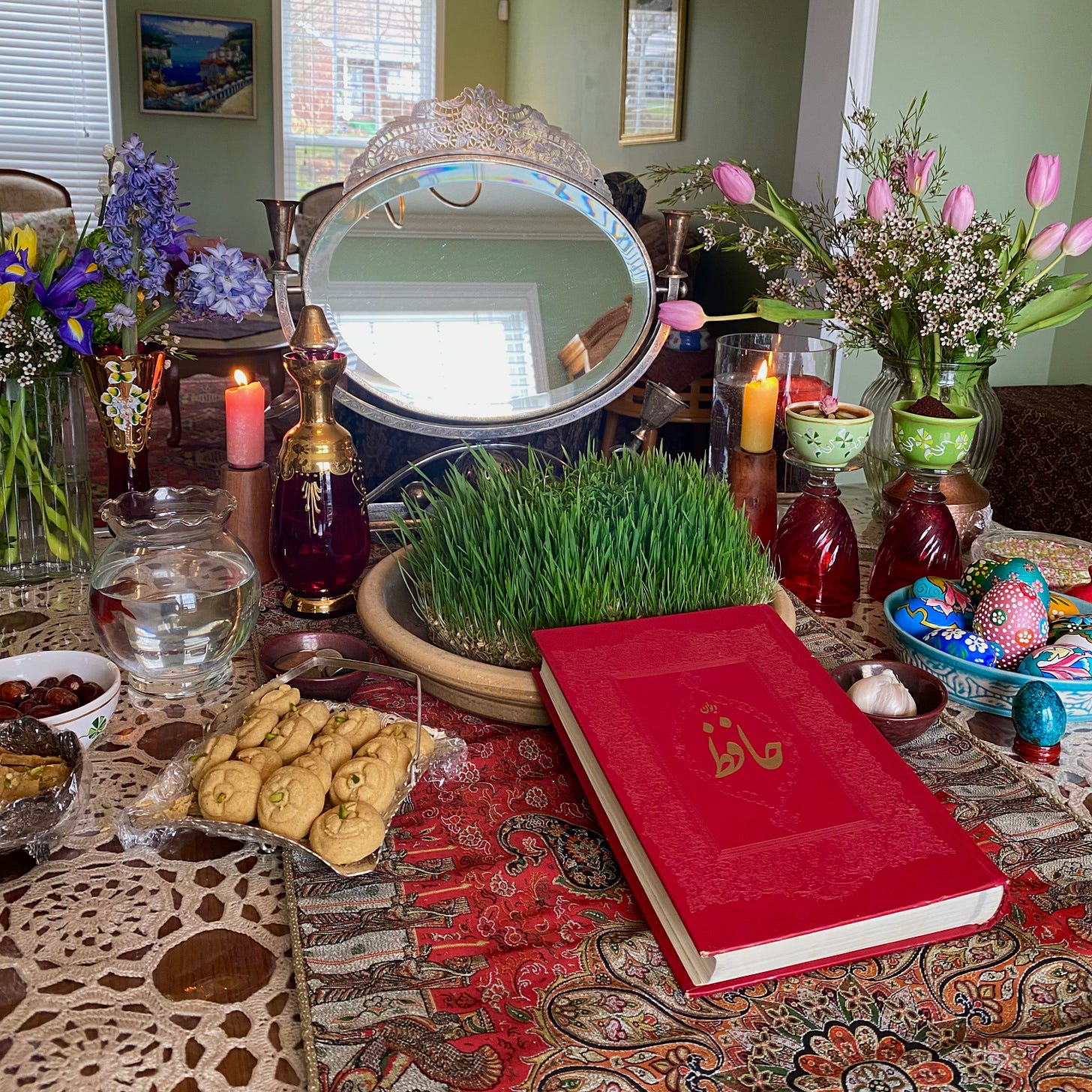💌 Metamorphosis, Part 2 💌
Nowruz as borderless liberation and resistance.
Around this time last year, I gathered my feelings around Nowruz, my new year, the first day of spring, as it came around. I wrote about the natural world’s first signs of a spring blossom reverberating throughout my mortal body. I shared my maturing relationship with confidence and love, and resolutions I’m still planting seeds to achieve. This new year, I have such a different relationship with my Iranian self, and am learning how multidimensional that side of me, and my community, really is.
I used to call this holiday the Persian new year. I thought that’s what it was, so that’s what I called it. A simple Wikipedia search shows us it doesn’t make any sense whatsoever to call Nowruz by this name. This holiday is celebrated in:
Afghanistan
Albania (by Bektashi Muslims)
Armenia (by Iranian-Armenians, Kurds and Yazidis)
Azerbaijan
Bahrain (by Persians of Bahrain)
Bangladesh (by Shia Muslims and others)
Canada (by Iranian-Canadians and Turkic-Canadians)
China (by Xinjiang Tajiks and Turkic peoples)
Cyprus
Georgia (by Azerbaijani-Georgians)
India (by Parsis, Iranis, and some Indian Muslims)
Iran
Iraq (by Kurds and Turkmen)
Israel (by Baháʼís and some Iranian Jews)
Kazakhstan
Kosovo
Kyrgyzstan
North Macedonia
Mongolia (by Bayan-Ölgii Kazakhs)
Pakistan (by Baloch, Baltis, Parsis, Iranis, Pashtuns, Ismaʿilis, Shia Muslims)
Russia (by Tatars, Bashkirs, Tabasarans and others)
Syria (by Kurds)
Tajikistan
Turkey (by Azerbaijani-Turks, Kurds, and Yörüks)
Turkmenistan
Ukraine (by Crimean Tatars)
United Kingdom (by British-Iranians)
United States (by Iranian-Americans and Turkic-Americans)
Uzbekistan
I stare at this list and with so much curiosity. To imagine I share a cultural tradition with communities in places like Ukraine and China completely dissociates my understanding of my Iranian identity in such an exciting and radical sense, and calls into question how I situate myself.
This celebration is about 3500 years old. 3500. 3500! The hearts of over 300 million people are united in this celebration. To tie a celebration like this to our modern borders is ridiculous. I notice, in general, when my diaspora talks about who we are as Iranians, they often talk about what we are not: we are not Arab, we are not pious Muslims, we do not speak Arabic, we are not like other countries in the global south. We draw impenetrable, superiority-minded borders around ourselves. Of course, there are Iranians that are Arab, that are pious Muslims, that do speak Arabic, that are everything and fit every box you could imagine. The focus on the unique, pure, and untainted symbolic Persians is embarrassing to me. 50% of my country is not Persian, and I choose to celebrate this diversity rather than ignore it. Each Iranian is equally important to me, and each of their cultures and narratives are part of our future. The oppressed still have the capacity to be the oppressor.
As a Persian Iranian, I know there is so much beauty in my Persian ethnicity. Of course there is. I also recognize we are the richest and most privileged ethnic group in Iran with a lot of blood on our hands. I don’t shy away from the nuanced intersectionality of the different Iranic peoples, which brings me back to Nowruz. Clearly, if this celebration is anchored with ancient roots, roots that stretch beyond man made borders or conflicts, and its mythology is so opaque and ambiguous– why do we insist on perpetuating it as singularly Persian?
In the former Soviet Union countries, Nowruz was banned as it was seen as a religious display. In Iran, celebrating the New Year has been considered “un-Islamic” after the 79 Revolution, and reports this year have been leaked of officials advocating to ban any ethnic minority symbols on display during this year’s celebrations. In Afghanistan, the Taliban forbids Nowruz. Kurds celebrate this holiday despite their continued forced separation and apartheid.
Liberation blooms from a deep rooted connection to our communities, our communities that are fluid, nuanced, and interwoven. Nowruz, like our other cultural celebrations, is a symbol of resistance. We need to think more critically about inclusivity or else history will keep repeating itself. There is nothing progressive about people from marginalized groups perpetuating imperialism. I have such a deep love for Iran’s future, and I treat things I love with such calculated care. Words matter.
Everybody thinks their own version of the past is the correct one, and we each draw our own lines in the sand regarding history when it’s convenient and agrees with our own argument. We see the things we want to see, we absorb the information that makes us feel good. Everyone, everyone is guilty of this. But this is fact: Nowruz transcends religion, identity, borders, patriarchy, citizenship, colonization, linguistics, and nationalism. It is every tree that we plant. It is every river that flows. It is the very nature that unites us. This year, my metamorphosis is to never, in any circumstance, shy away from my core values that make me the Iranian woman that I am, and continue to resist any form of oppression against my borderless community.


